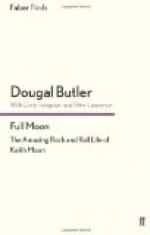Barrant eyed the elder man with a puzzled curiosity which was tolerably masked by official impassivity. Barrant had his own methods of investigation and inquiry. He brought an alert intelligence, a seeing eye, and a false geniality to bear in his work. Unversed in elaborate deduction, he flattered himself that he knew enough about human nature to strike the balance of probabilities in almost any case. His cardinal article of faith was that there was nothing like getting on good terms with those he was interviewing in order to find out things. Most people were on their guard against detectives, who too often took advantage of their position to assume offensive airs of intimidation, whereas the great thing was to disarm suspicion by a friendly manner. Barrant had cultivated pleasantness with considerable success. Some who were not good judges of physiognomy were apt to overlook the watchful eyes in his smiling affable presence, and talk freely—sometimes too freely, as they later on discovered to their cost. A chance word, a significant phrase, was sufficient to set him burrowing underground with the activity of a mole, to burst into the open later on with all his clues complete, to the confusion of the trusting person with an unguarded tongue.
He had put these tactics into execution with Austin Turold. Austin, taking tea when he called, in a bright blue room hung with pictures, had received his visitor with a charming cordiality, insisted on his taking tea with him, and then let loose a flood of small-talk, as though he were delighted with his visitor. His welcome was so perfect, his manners so gracefully unforced, that Barrant had an uneasy suspicion that he was being beaten at his own game, and was slightly out of countenance in consequence. Up to that moment he could not, for the life of him, decide whether Austin Turold’s polished self-assurance was a mask or not. It seemed too natural to be assumed.
“Your own opinion is that your brother committed suicide?” he asked again.
“No other conclusion is possible, in my mind.”
“But did he have any reason, that you know of, to commit suicide?”
Austin shrugged his shoulders. “Suicide is not usually associated with reason,” he observed. “But in Robert’s case there is a reason, or so it seems to me. I have not seen him for many years, but during my recent close association with him I was struck by two things: the solitary aloofness of his mind, and his overwhelming pride—pride in the family name. These two traits in his character coloured all his actions. In the first place, he disliked opening his mind to anybody, but the stronger influence, his family pride, overcame his habitual secretiveness when he thought it necessary and desirable to do so in furtherance of his darling ambition—the restoration of this title. Men who lead a solitary, self-contained life, like my brother, become introspective and ultra-sensitive, and face any intimate personal revelation with the utmost reluctance. They will nerve themselves to it when the occasion absolutely requires, but the after effects—the mental self-probings, the agonized self torture that a self-conscious proud man can inflict on himself when he comes to analyze the effects of his disclosure on other minds, are sometimes unendurable.”




